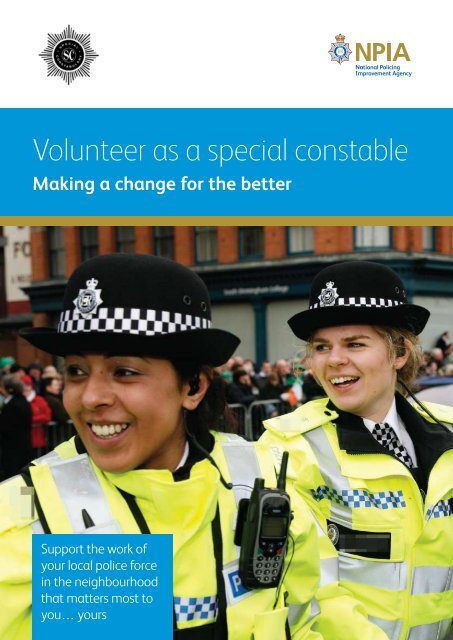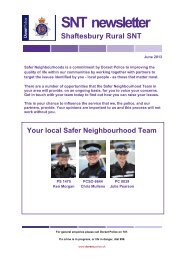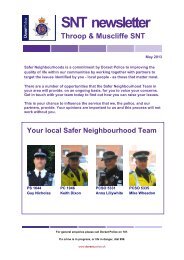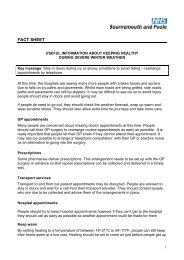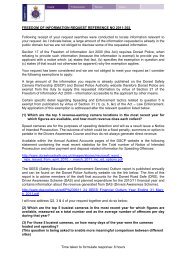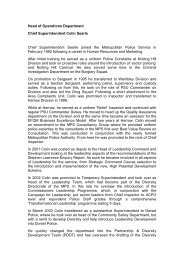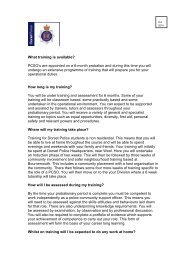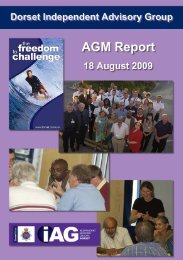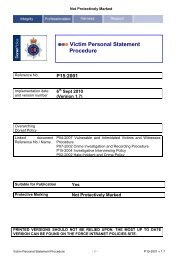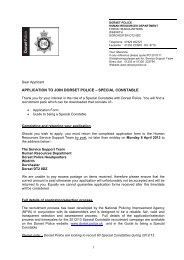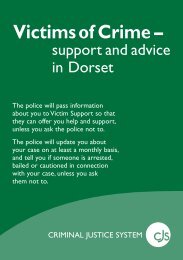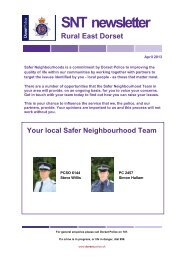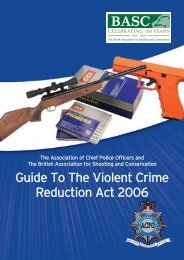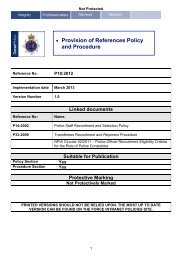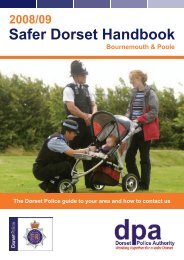Special Constable Recruitment Brochure - Volunteer ... - Dorset Police
Special Constable Recruitment Brochure - Volunteer ... - Dorset Police
Special Constable Recruitment Brochure - Volunteer ... - Dorset Police
You also want an ePaper? Increase the reach of your titles
YUMPU automatically turns print PDFs into web optimized ePapers that Google loves.
<strong>Volunteer</strong> as a special constable<br />
Making a change for the better<br />
Support the work of<br />
your local police force<br />
in the neighbourhood<br />
that matters most to<br />
you… yours
2<br />
Could you volunteer?<br />
What is the <strong>Special</strong> Constabulary?<br />
The <strong>Special</strong> Constabulary is a force of trained volunteers who work alongside, and<br />
support, their local police. Find out more about the people involved, what they get<br />
from their involvement and how special constables fit into the police service.<br />
All specials are fully trained and<br />
are briefed ahead of every duty<br />
What’s inside<br />
02 What is the <strong>Special</strong><br />
Constabulary?<br />
04 What do they do?<br />
05 Why become a<br />
special?<br />
06 What is<br />
neighbourhood<br />
policing?<br />
07 What skills do I need?<br />
08 How will it change<br />
my life?<br />
10 What is the Employer<br />
Supported Policing<br />
programme?<br />
12 Can I join the<br />
specials?<br />
13 What next?<br />
<strong>Special</strong> constables play a crucial<br />
role in fighting crime and making<br />
our streets safer. ‘<strong>Special</strong>s’, as<br />
special constables are known,<br />
come from many different<br />
backgrounds and all walks of life.<br />
They volunteer a minimum of four<br />
hours per week and form a vital<br />
link between their community and<br />
regular police officers.<br />
<strong>Special</strong>s have to complete a<br />
training programme, after which<br />
they have the same powers as<br />
regular police officers and wear a<br />
similar uniform.<br />
There are over 14,000 of these<br />
extraordinary people in the country,<br />
and we’re looking for more.<br />
If you would like to help make your<br />
neighbourhood a better place and<br />
are ready for an exciting challenge,<br />
read further to find out how you<br />
can become a special.<br />
What is a special?<br />
• <strong>Special</strong>s are volunteer police<br />
officers with the same powers<br />
as regular officers.<br />
• <strong>Special</strong>s spend a minimum of<br />
four hours a week, or more,<br />
supporting the police to tackle<br />
crime in their communities.<br />
• <strong>Special</strong>s are recruited locally by<br />
all 43 police forces in England<br />
and Wales.<br />
• <strong>Special</strong>s work in partnership<br />
with regular officers and the<br />
wider policing family.<br />
If you would like this document in another format, please contact Equality,<br />
Diversity and Human Rights. T 01256 602358 E diversity@npia.pnn.police.uk
Do you want a challenge?<br />
3<br />
Who can become<br />
a special?<br />
• The <strong>Special</strong> Constabulary is<br />
made up of all kinds of people,<br />
from all walks of life and with<br />
a wide variety of skills and<br />
experiences.<br />
• <strong>Special</strong>s are men and women<br />
of all races and faiths.<br />
• <strong>Special</strong>s must be 18 or over.<br />
What’s in it for you?<br />
• The satisfaction of supporting<br />
your community.<br />
• The opportunity to learn new<br />
transferable skills and gain<br />
valuable experience.<br />
• The opportunity to work in<br />
a professional environment,<br />
supported by up-to-date<br />
training and knowledge.<br />
• A chance to challenge yourself<br />
and show what you’re capable<br />
of.<br />
• An opportunity to learn about<br />
the police before committing to<br />
a job within the service.<br />
Will it change you?<br />
• You can grow in self-confidence<br />
and may discover personal<br />
strengths not previously<br />
recognised.<br />
• You’ll improve your<br />
communications skills.<br />
• You’ll learn a great deal about<br />
your community.<br />
You can make a difference in<br />
the local community<br />
• You’ll develop new contacts,<br />
associations and firm<br />
friendships.<br />
<strong>Police</strong> service roles<br />
• <strong>Police</strong> officers.<br />
• <strong>Police</strong> community support<br />
officers (PCSOs) – members<br />
of the force, focusing on lower<br />
level crime, disorder and antisocial<br />
behaviour in communities<br />
(no power of arrest).<br />
• <strong>Police</strong> Support <strong>Volunteer</strong> roles<br />
– non-uniformed staff working<br />
in areas such as call handling,<br />
crime analysis and customer<br />
service.
4<br />
Do you want a challenge?<br />
What do they do?<br />
From tackling anti-social behaviour to crowd control at major events,<br />
the work of a special is varied, challenging and, above all, rewarding.<br />
<strong>Special</strong>s take part in front-line<br />
police work. They spend most of<br />
their time on the streets, doing<br />
intelligence-based patrols in<br />
crime hotspots or taking part<br />
in crime-prevention initiatives.<br />
This could mean anything from<br />
keeping town centres safe at<br />
night through to conducting<br />
house-to-house enquiries or<br />
helping prevent vulnerable<br />
members of the community from<br />
becoming victims of crime. It’s<br />
hard, demanding work, but from<br />
your first day on duty, you’ll see<br />
the impact you’re having. It’s<br />
also extremely varied, and you<br />
could easily find yourself doing<br />
any of the following:<br />
Ensuring public<br />
safety<br />
• Assisting at the scene of<br />
accidents, fires or incidents<br />
– helping control situations,<br />
ensuring people are safe.<br />
• Providing security and crowd<br />
control at major public events<br />
– preventing injuries and<br />
disorder.<br />
Preventing crime<br />
• Carrying out high-visibility foot<br />
patrols to deter and detect<br />
criminals.<br />
• Educating businesses and<br />
older people about crime<br />
and how to avoid it to reduce<br />
opportunistic crime and<br />
people’s fear of it happening.<br />
• Talking to school children<br />
about crime reduction<br />
and community safety to help<br />
them stay safe and make the<br />
right choices.<br />
Tackling crime<br />
• Confronting anti-social<br />
behaviour on the streets such<br />
as gangs or intimidating<br />
behaviour.<br />
• Managing alcohol-related<br />
incidents such as public<br />
drunkenness or violence.<br />
• Enforcing road safety<br />
initiatives such as traffic<br />
speed in local communities.<br />
Investigating crime<br />
• Conducting house-tohouse<br />
enquiries to gather<br />
information and support<br />
larger enquiries.<br />
Securing convictions<br />
• Present evidence in court to<br />
support the justice system in<br />
prosecuting offenders.<br />
I’m a working, single mum.<br />
As a special I work alongside<br />
regulars performing duties<br />
which include drugs raids and<br />
issuing warrants. I enjoy Friday<br />
or Saturday evening shifts<br />
where possible, and I also like<br />
policing football matches.<br />
Ailsa Pate<br />
<strong>Special</strong>, Lancashire<br />
Developing as a<br />
special<br />
Once you have been trained<br />
and have practical experience<br />
you’ll be able to take on more<br />
responsibility as a special.<br />
Training is available on an<br />
ongoing basis and some forces<br />
have ranks within the <strong>Special</strong><br />
Constabulary so volunteers can<br />
be promoted as their experience<br />
and skills develop. This means<br />
that you’ll constantly be faced<br />
with new challenges and the<br />
opportunity to acquire new skills.<br />
<strong>Special</strong> constables have<br />
the same responsibilities and<br />
powers as regulars. They follow<br />
the same rules of conduct as<br />
regular officers and have the<br />
same disciplinary procedures.<br />
Like regulars, they also have the<br />
same power of arrest.
Do you want a better community?<br />
5<br />
Why become a special?<br />
If you’re looking for a challenge, become a special and find out what you’re<br />
capable of – for yourself and your community.<br />
Becoming a special may<br />
provide you with new skills<br />
useful for your career and life<br />
As a special constable you can<br />
make a direct contribution to your<br />
local community. You will help<br />
fight crime and forge stronger<br />
connections between the police<br />
and the people they serve. If you<br />
don’t wish to become a special<br />
constable but still want to support<br />
your police service you could<br />
become a police support volunteer,<br />
providing back-up services that<br />
allow regulars to get on with their<br />
primary duties.<br />
Find out what you<br />
are capable of<br />
The truth is that we are all capable<br />
of far more than we know and<br />
becoming a special is one of the<br />
best ways to learn new transferable<br />
skills and develop untapped<br />
potential. You’ll face exciting<br />
challenges, acquire valuable skills<br />
that will assist in your personal and<br />
career development, and you can<br />
take pride in your achievements<br />
and bolster your self-respect and<br />
confidence.<br />
See a different world<br />
Out on patrol, you will deal with<br />
situations and people you would<br />
probably never encounter in your<br />
day-to-day life. Most of all, you’ll<br />
get to see the real impact of<br />
crime on people’s lives and the<br />
extraordinary power you have<br />
as an individual to make a real<br />
difference. Being a special is one of<br />
the most eye-opening things you<br />
can do. It literally is a life-changing<br />
decision.<br />
Whatever your plans, you’ll find<br />
working as a member of the wider<br />
police service family, alongside<br />
regular officers of all ranks and<br />
other volunteers, an exciting, and<br />
rewarding experience.<br />
As a special you have duties and<br />
responsibilities to fulfil. I’m quite<br />
a well-known judo expert locally<br />
and one day, although I was offduty<br />
at the time, I was asked to<br />
help disarm a would-be attacker<br />
who was spotted brandishing a<br />
knife in Scarborough town centre.<br />
I was able to approach him with<br />
confidence and authority, secure<br />
the weapon and ensure no harm<br />
came to the general public.<br />
Rafl Aghanian,<br />
<strong>Special</strong>, North Yorkshire<br />
Make the streets<br />
safer<br />
<strong>Special</strong>s are rightly proud of the<br />
amazing work they do. Going out<br />
onto the streets to tackle crime<br />
helps increase public safety and<br />
maintain community spirit. It<br />
makes neighbourhoods better<br />
places to live, it helps young people<br />
make positive choices in their lives<br />
and it helps specials become more<br />
confident and respected members<br />
of their communities. Interested?<br />
Then read on to find out what kind<br />
of people we’re looking for.
6<br />
Are you local hero material?<br />
A local response<br />
The <strong>Special</strong> Constabulary is an excellent bridge between the police service and the<br />
public, representing both the community within the police service and the police<br />
service within the community.<br />
The success of neighbourhood<br />
policing across the country owes<br />
a great deal to the important<br />
contribution of specials,<br />
who provide a link between<br />
regular police officers and the<br />
community. <strong>Special</strong> constables<br />
live within the communities<br />
they serve and are well placed<br />
to investigate and solve local<br />
crimes and find solutions to<br />
local problems. The flexibility of<br />
specials, who often can work at<br />
evenings and weekends, gives<br />
forces the extra resources they<br />
need to deal with the issues that<br />
really matter to local people such<br />
as speeding, graffiti, trespassing<br />
and underage drinking.
Could you be a special?<br />
7<br />
The skills you need<br />
<strong>Special</strong>s have many varied talents, but a positive attitude and thorough training<br />
will give you a great start. Support and training are ongoing as you develop.<br />
The <strong>Special</strong> Constabulary<br />
welcomes applications from<br />
people of all walks of life and<br />
backgrounds. One of the most<br />
important requirements for all<br />
specials is a commitment to<br />
making a positive difference in<br />
their local area.<br />
Does this sound<br />
like you?<br />
While there is some paperwork<br />
involved in police work, don’t<br />
be put off by a lack of formal<br />
qualifications. The kind of people<br />
we need have good life skills<br />
and experience plus a strong<br />
community awareness. They<br />
need to be able to:<br />
• stay calm in a crisis<br />
• communicate clearly<br />
• resolve disputes tactfully<br />
• think laterally and solve<br />
problems<br />
• plan and take the initiative<br />
• be tolerant and work well in a<br />
team<br />
• be honest, fair and impartial<br />
• act with integrity<br />
• treat the public and their<br />
colleagues with respect and<br />
courtesy.<br />
Training to develop<br />
your skills<br />
Before becoming a special<br />
constable all recruits are fully<br />
trained in areas including:<br />
• what the police force does<br />
• the role, powers and duties of<br />
police officers<br />
• preventing, detecting and<br />
handling common crimes<br />
• preparing evidence for court<br />
• conflict resolution and<br />
handling difficult situations<br />
• self-defence.<br />
The training you get as a special<br />
constable, can be valuable<br />
and useful in your career and<br />
personal life. As a new special<br />
you’ll continue to receive all<br />
the support and supervision<br />
you need to feel comfortable<br />
carrying out your duties.<br />
As you develop, your role as<br />
a special can grow with you.<br />
Training is ongoing and there will<br />
be opportunities to take on more<br />
responsibility so you’re constantly<br />
challenged and learning new<br />
skills.<br />
I work for Rotherham Borough Council<br />
and I am married with one child. As a new<br />
special, my involvement in a plain clothes<br />
operation to set up a weekly meeting place<br />
for teenagers was one of my first tasks; and<br />
it’s been challenging. The project has helped<br />
build a rapport with the kids, which helps<br />
when you meet them on general patrol. I also<br />
think we’ve dispelled the myth that the police<br />
always give them a hard time. They know<br />
now that we are approachable and are just<br />
normal human beings.<br />
James Keeley,<br />
<strong>Special</strong> <strong>Constable</strong>, South Yorkshire
8<br />
Do you want a better community?<br />
How will it change my life?<br />
With many opportunities for promotion and further training, plus the benefit to your<br />
CV, becoming a special can not only boost your career – it can change your life.
Do you want a better community?<br />
9<br />
Becoming a special and helping<br />
keep your community safe is one of<br />
the most rewarding decisions you<br />
can make. As well as all the skills<br />
you learn and the new experiences<br />
you gain, it will have an affect on<br />
other areas of your life.<br />
training you can be promoted<br />
and take on more responsibility.<br />
You may also have the option of<br />
training to join specialist teams –<br />
like marine support, dog units and<br />
roads policing.<br />
Kit, training and<br />
expenses<br />
When you give your time, you will<br />
receive your uniform, equipment<br />
and training. You will also be<br />
able to claim expenses to cover<br />
your costs, and some forces offer<br />
additional allowances for specific<br />
commitments, but this varies by<br />
area.<br />
Development<br />
opportunities<br />
Some forces have a rank structure<br />
in their <strong>Special</strong> Constabulary, so<br />
with the right experience and<br />
Husband and wife, Chas and<br />
Lorraine Maiden (main picture<br />
with their son and in uniform<br />
as specials top right)<br />
We’re both specials. Chas<br />
joined first but I didn’t just<br />
follow suit. We often go on<br />
patrol together, while our<br />
son stays with Grandma. I<br />
welcome the opportunity to<br />
have time out from the house<br />
where I work as a registered<br />
childminder.
10<br />
Do you want to make a difference?<br />
Employer Supported Policing<br />
Organisations in partnership with the specials create an excellent profile for<br />
themselves in the community, and reap other tangible benefits that make<br />
them stronger. <strong>Special</strong>s commit a minimum number of hours of their time<br />
every week (usually four) to vital front-line police work. As most also work fulltime,<br />
they depend on the encouragement and support of their employers.<br />
Support from<br />
employers<br />
People often ask if having an<br />
outside commitment like being<br />
a special could upset their<br />
employers. Our experience is that<br />
employers are usually extremely<br />
happy for staff to become<br />
specials and many actually<br />
support them by giving staff paid<br />
time off while they’re on duty.<br />
Some organisations actively<br />
encourage their staff to become<br />
specials and work in partnership<br />
with the <strong>Special</strong> Constabulary.<br />
Even employers who don’t give<br />
time off still respect the work<br />
specials do.<br />
The reason is straightforward.<br />
The skills that you learn, like<br />
communication, working under<br />
pressure, leadership and conflict<br />
management, are hugely<br />
valuable to businesses and can<br />
make you a much more attractive<br />
employee. Ask an employer<br />
to describe the kind of people<br />
they want to hire and they’ll<br />
say dedicated, responsible,<br />
committed people – just the kind<br />
of people who become specials.<br />
Put simply, being a special looks<br />
great on your CV!<br />
If you are considering becoming<br />
a special and you are worried<br />
about what your boss might<br />
think, visit www.npia.police.<br />
uk/specials and search under<br />
‘<strong>Special</strong>s employer support’ for<br />
help and advice.<br />
Benefits to<br />
employers<br />
As mentioned above, the skills<br />
that you learn and develop as a<br />
special are directly transferable<br />
to your full-time career and are a<br />
positive benefit to your company<br />
at no cost to your employer.<br />
There are wider benefits too.<br />
• Supporting the local community<br />
generates positive PR.<br />
• Staff development at little<br />
or no cost – research reveals<br />
that it would cost companies<br />
£7,800 per employee to<br />
provide similar training.<br />
• Positive promotional<br />
opportunities for the company<br />
– free editorial coverage in<br />
local newspapers.<br />
• Improved staff morale<br />
and motivation – a fulfilled<br />
employee is a happy<br />
employee.<br />
• Greater staff retention and<br />
lower recruitment costs –<br />
employees are more likely to<br />
be loyal.<br />
• Tackling local crime and<br />
disorder.<br />
In addition, specials provide<br />
a visible police presence in an<br />
organisation’s area. <strong>Special</strong>s<br />
can help reduce crime rates and<br />
reduce fear of crime among their<br />
employer’s clients and staff.<br />
How can my<br />
organisation get<br />
involved?<br />
Your local force co-ordinator<br />
will be happy to discuss the<br />
best arrangement for your<br />
organisation, and can speak<br />
directly to your employer about<br />
the benefits of having staff<br />
volunteer as specials.<br />
If your employer is keen to<br />
be involved they can support<br />
members of staff who want to<br />
sign up by agreeing to a fixed<br />
number of paid or unpaid hours<br />
a month so they can carry out<br />
their duties. Your employer<br />
can also recognise volunteers’<br />
achievements and training<br />
of staff through appraisal<br />
procedures or an award scheme.<br />
I wanted to give something back<br />
to the community I grew up in<br />
and being a special was the most<br />
effective and direct way I could<br />
think of. Like being a magistrate<br />
or town councillor, being a special<br />
constable is classified by my<br />
company as a civic activity, so I<br />
get a specified number of days<br />
paid leave each year for this work.<br />
Dave Hutchinson<br />
Cheshire
Have you realised your true potential?<br />
11<br />
What kind of scheme<br />
is available?<br />
The Employer Supported Policing (ESP)<br />
programme has been running successfully<br />
in a number of forces around the country.<br />
Staff within a participating organisation<br />
can volunteer to be Employer Support<br />
<strong>Special</strong> <strong>Constable</strong>s. Employers then allow<br />
these staff members time off during<br />
normal working hours to undergo their<br />
<strong>Special</strong> Constabulary training and then,<br />
once fully trained, they allow them an<br />
agreed amount of time off within a<br />
regular fixed period to undertake duties as<br />
a special.<br />
The main ESP scheme is suitable for<br />
employers and their staff across a broad<br />
range of industry sectors. In addition, the<br />
programme also has specific schemes<br />
that have grown out of partnerships with<br />
different sectors of employment. These<br />
include:<br />
• ShopWatch – unites retailers and the<br />
police in the fight against crime in<br />
stores and shopping areas.<br />
• ArtBeat – encourages experts working<br />
in the field of art and antiques to work<br />
together with detectives from the<br />
Metropolitan <strong>Police</strong>’s <strong>Special</strong>ist Art<br />
and Antiques Unit to help prevent and<br />
detect crime in this industry.<br />
• BoroughBeat – working in partnership<br />
with local authorities (initially in<br />
London), local authority staff are<br />
encouraged to volunteer as specials.<br />
• BusBeat – working with bus<br />
companies to provide police training<br />
for staff. This results in an increased<br />
sense of security for co-workers and<br />
for customers.<br />
• CampusWatch – aimed at university<br />
staff and students to help make the<br />
university campus a safer place to be.<br />
• HospitalWatch – This scheme<br />
encourages hospitals to work in<br />
partnership with the police to help<br />
improve safety and provide greater<br />
reassurance for the staff who work<br />
there and the members of the public<br />
who use them.<br />
There are currently<br />
hundreds of British Telecom<br />
staff who work as specials,<br />
and BT is demonstrating its<br />
commitment to the <strong>Special</strong><br />
Constabulary by giving our<br />
employees who work as<br />
specials additional days<br />
leave to spend on their<br />
volunteer duties.<br />
Robert Leach<br />
BT<br />
Find out more<br />
To find out more about the kind of partnership that your<br />
organisation could have with the <strong>Special</strong> Constabulary, contact<br />
Nadine Fairweather: nadine.fairweather@npia.pnn.police.uk
12<br />
Could I be a special?<br />
Can I join the specials?<br />
The <strong>Special</strong> Constabulary recruits people of all ages and backgrounds, but there<br />
are a few basic criteria that you will need to meet if you want to become a special.<br />
Those applying to become a<br />
special constable must satisfy the<br />
following basic criteria:<br />
Nationality<br />
You must be from a country in the<br />
European Economic Area or have<br />
leave to enter and remain in the<br />
UK free of restrictions.<br />
Education<br />
You don’t need any formal<br />
qualifications. However, you will<br />
have to pass written tests.<br />
Time<br />
You must be available to volunteer<br />
for four or more hours a week,<br />
usually in a single shift (the<br />
Metropolitan <strong>Police</strong> Service initially<br />
ask for eight hours a week).<br />
Age<br />
You must be at least 18 to<br />
apply. There is no upper limit for<br />
becoming a special.<br />
Height<br />
There is no minimum height<br />
requirement.<br />
Health and fitness<br />
You need to be in good health.<br />
Some forces use a fitness test.<br />
Occupation<br />
You do not need to be working to<br />
become a special. We welcome<br />
applications from the unemployed<br />
and from those at home bringing<br />
up a family. Some people’s<br />
jobs will, however, be deemed a<br />
conflict of interest. Members of<br />
the armed forces, for example,<br />
can’t serve as specials. For details<br />
My shifts are mainly in the evenings<br />
and weekends – the busiest periods for<br />
rowdiness in the high streets.<br />
During the day I may help carry out road<br />
checks and issue speeding tickets. I’m<br />
often involved in local fêtes and I tend to<br />
work a lot with young people, moving on<br />
nuisance groups or seizing alcohol.<br />
Missy Tsim,<br />
<strong>Special</strong>, Kent<br />
of other jobs affected, please visit<br />
the specials website at<br />
www.npia.police.uk/specials.<br />
Character and<br />
previous convictions<br />
You must be of good character<br />
and must not associate with any<br />
known criminals. If you have<br />
previous minor convictions or<br />
cautions, this could disqualify<br />
you from becoming a special;<br />
it will depend on the type of<br />
offence. If you are a member<br />
of an inappropriate group (for<br />
example the British National<br />
Party), this could disqualify you<br />
from becoming a special.
Are your ready for a new challenge?<br />
13<br />
What next?<br />
You’ve now heard all about the role of a special, so whether you still have more<br />
questions or are ready to apply, it’s time to take the next step.<br />
Ready to become<br />
a special?<br />
If you’ve got this far, we hope you’re<br />
really interested in becoming a special.<br />
If you think it might be for you but<br />
have more questions, read the ‘Got<br />
a question?’ section below. If you’re<br />
ready to apply, read ‘Three steps to<br />
becoming a special’.<br />
Three steps to<br />
becoming a special<br />
1 Find your nearest force by visiting<br />
www.policecouldyou.co.uk.<br />
2 Complete the form and post it to<br />
the force that you’re applying to.<br />
3 Go through the individual force’s<br />
recruitment procedure.<br />
Got a question?<br />
Get in touch by:<br />
• emailing<br />
specialsteam@npia.pnn.police.uk<br />
• calling<br />
0207 021 7065<br />
• visiting<br />
www.npia.police.uk/specials<br />
Apply today and do something special<br />
for yourself and your community.<br />
Impress yourself today with what<br />
you can achieve
14<br />
Your notes here
The voluntary police service<br />
<strong>Special</strong> constable preliminary application form<br />
C O N<br />
S<br />
S P E C<br />
T A<br />
I A L<br />
B U<br />
L A R Y<br />
Please send the completed form to your chosen police force<br />
Are you right for the specials?<br />
Applicant’s URN:<br />
Serving as a special constable is demanding. It requires a regular commitment from you and will involve<br />
various types of police duties, as well as ongoing training for them. In return, you will benefit from the<br />
satisfaction of providing a service to your local community. If this is a commitment you are willing to make,<br />
we welcome your application.<br />
Personal Details Title: Name:<br />
Address:<br />
Postcode:<br />
Daytime Telephone:<br />
Mobile Telephone:<br />
Evening Telephone:<br />
Home Email:<br />
Work Email:<br />
Age<br />
<strong>Special</strong> constables must be aged at least 18<br />
years on appointment. Forces may use their<br />
discretion on upper age limits, these may vary.<br />
Date of birth:<br />
Nationality<br />
Occupation<br />
People in some occupations are not eligible to become a<br />
special constable. There are other occupations, which may<br />
be seen as incompatible with becoming a special constable,<br />
but where individual force discretion applies.<br />
Occupation:<br />
You must either be a national of a country within the European Economic Area or, if not, have leave to enter or<br />
remain in the UK free of restrictions. Does this apply to you?<br />
Yes: No: Nationality:<br />
If you have lived abroad in the last three years there may be complications in processing your application<br />
because of difficulties with security checking. If you have lived abroad and would still like to pursue your<br />
application please tell us your last overseas address:<br />
Published by NPIA<br />
<strong>Special</strong> Constabulary applicant status sheet<br />
From:<br />
For constabulary/force use only<br />
✂<br />
Tear here<br />
Outcome of attached applicant<br />
Applicant’s URN:<br />
This section is to be completed by the police force you apply to. This information will help us evaluate our<br />
recruitment process.<br />
This applicant has been rejected because of:<br />
This applicant<br />
has been<br />
recruited<br />
as a special<br />
constable<br />
Failure to complete/<br />
return the force<br />
application form<br />
Failure to meet the recruitment criteria<br />
(for example, age, nationality, numeracy,<br />
literacy, occupation, health)<br />
If applicant is rejected, has the force encouraged them to offer service as<br />
a police staff volunteer?<br />
Yes: No: If No, why?
Nationality<br />
White:<br />
British<br />
Irish<br />
Other background<br />
Mixed:<br />
White/Black<br />
Caribbean<br />
White/<br />
Black<br />
African<br />
White/<br />
Asian<br />
Other background<br />
Black/Black British: Caribbean African Other background<br />
Chinese/Chinese British: Chinese Other background<br />
Asian or Asian British: Bangladeshi Indian Pakistani Other Asian background<br />
The police service is committed to equal opportunities and welcomes applications from all sections of the<br />
community irrespective of race, ethnicity, gender, sexual orientation, religion and belief.<br />
Character<br />
A special constable must be of good character. It is an office of trust and while any previous convictions will<br />
not automatically disqualify an application, they need to be given careful consideration.<br />
Have you any spent or unspent convictions, apart from mixed penalty driving offences?<br />
Spent: Yes No<br />
Unspent: Yes No<br />
If the answer to either of the above is ‘Yes’ please briefly describe these offences (with dates):<br />
This information will be treated in confidence<br />
Previous experience<br />
Have you ever served in a police force as a regular or a special constable? Yes No<br />
If ‘Yes’ please give details:<br />
Declaration* Signed: Date:<br />
* I declare this information to be true to the best of my knowledge<br />
S P E C<br />
I A L<br />
C O N<br />
S<br />
T A<br />
B U<br />
L A R Y<br />
PD04601109


